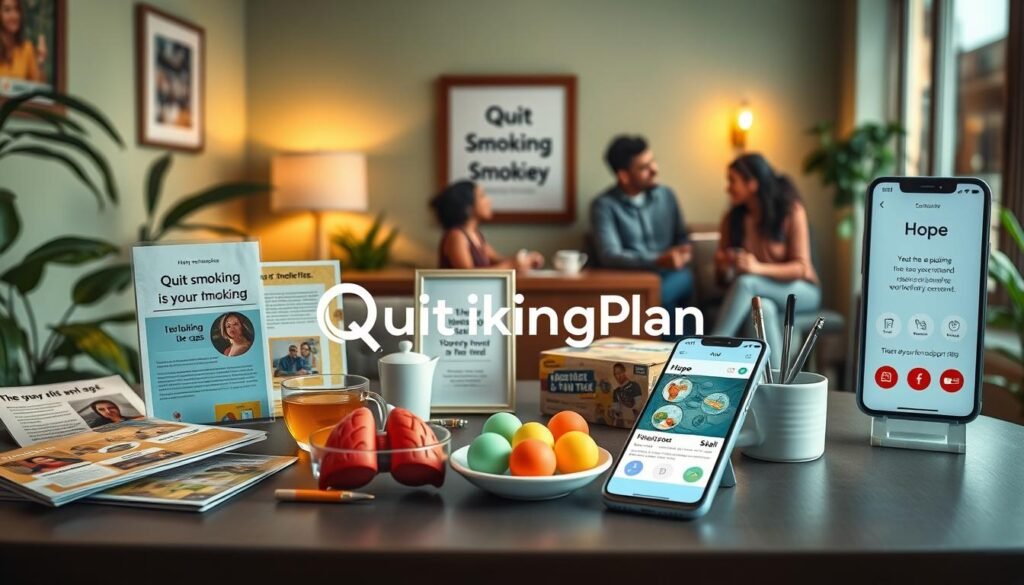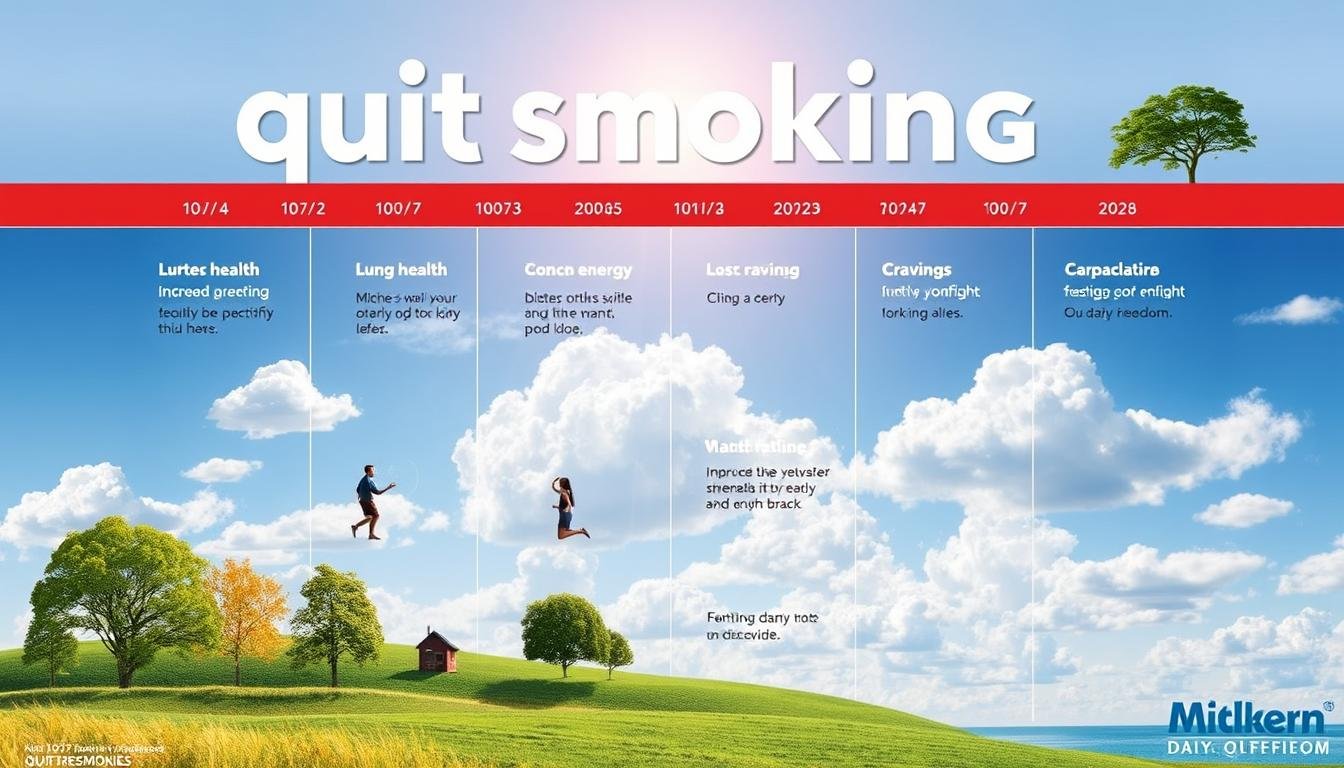Ever thought about how quitting cigarettes could change your health and happiness?
Quitting smoking is a big step towards a better life. It’s not just about stopping a habit. It’s about improving your health, mind, and social life. Studies show quitting can add up to 10 years to your life1.
It lowers the risk of heart disease and some cancers. Plus, it boosts your mental health2. Imagine breathing easier, feeling better, and connecting more with others. Quitting smoking can change your life, opening up new chances and stronger bonds with friends and family.
Key Takeaways
- Quitting smoking can significantly enhance your quality of life.
- Health benefits include reduced risks of cancer and cardiovascular diseases.
- Improved mental health follows the cessation of smoking.
- Quitting smoking contributes to longer life expectancy—up to 10 years.
- Cessation leads to better social interactions and relationships.
- Immediate benefits include improved taste, smell, and overall physical comfort.
Introduction to Quitting Smoking
Quitting smoking is often a choice to improve your health and life quality. Knowing the benefits of quitting smoking helps motivate people on this journey. Health campaigns and personal stories push many to make this big change.
Quitting smoking greatly reduces health risks. For example, those who quit before 50 cut their risk of dying by half in 15 years compared to smokers3. Living without cigarettes not only boosts your health but also improves the lives of those around you.
Quitting can be tough, with myths making it harder. Misbeliefs about nicotine addiction or weight gain can slow you down. But, knowing these myths helps clear the way. Even if you gain a bit of weight at first, the health benefits last much longer3.
Having friends and community support helps a lot. Counseling increases your chances of beating addiction4. Soon, you’ll see the benefits of quitting smoking go beyond just health to include emotional and social well-being.
The Immediate Health Benefits of Quitting Smoking
Quitting smoking brings many health benefits right away. Your body starts to change quickly, showing how good it feels to stop smoking.
Reduction in Heart Rate and Blood Pressure
Stopping smoking lowers your heart rate and blood pressure fast. Just a few minutes after quitting, your heart rate gets back to normal. Blood pressure also drops, which is good for your heart.
This quick change is a big reason to quit smoking. It shows you get rewards right away. Plus, the risk of heart problems goes down with each passing day.
Improved Lung Function and Oxygen Levels
Quitting smoking improves your oxygen levels in just hours. This means you can do more and feel stronger. Your lungs work better, too, which helps with coughing and breathing easier.
As time goes on, your body keeps getting better. Chronic bronchitis symptoms and lung disease risks go down a lot. These changes greatly improve your health and life quality56.

Long-Term Health Improvements After Quitting Smoking
Quitting smoking brings many health improvements post quitting smoking that make life better. The good effects of stopping smoking show up over time. You’ll see big improvements in your health.
Increased Life Expectancy
Studies show quitting smoking can add years to your life. If you quit before 40, you might live up to ten years longer. This is because quitting early cuts down the risk of dying from smoking-related diseases by about 90%7.
Those who quit between 36 and 44 could live up to nine years longer. This shows how quitting smoking can greatly increase your life span7.
Decreased Risk of Health Issues
Quitting smoking also lowers the risk of serious health problems. One year after quitting, your heart disease risk is half that of a smoker8. After five years, the risk of many cancers drops by 50%.
This shows your body starts to heal after you stop smoking8.
Reduction in Cancer Risks
Quitting smoking also lowers cancer risks. The risk of lung cancer drops to about half that of smokers after ten years8. Even after just a few years, lung cancer risk falls by up to 40%.
This greatly improves your long-term health chances7. These facts show quitting smoking is key to a healthier future.
Using resources like 800-QUIT-NOW can help you quit smoking. They offer support to help you enjoy these health benefits.
Quality of Life After Quitting Smoking
Quitting smoking greatly improves your life and health. You’ll feel better right away and for years to come. This leads to a new sense of health and energy.
Enhanced Physical Health
Stopping smoking makes your body feel much better. You’ll cough less and breathe easier. Plus, you’ll face fewer serious health problems, saving money on doctor visits.
Improved Respiratory Health
Quitting boosts your lung function quickly. Studies show lungs get better in just a few months, and you’ll get sick less often9. This means you can enjoy more activities and spend time with friends, things you couldn’t do when smoking.

| Aspect of Health | Before Quitting | After Quitting |
|---|---|---|
| Respiratory Issues | Frequent cough, breathlessness | Fewer infections, easier breathing |
| Physical Activity | Limited participation | Increased engagement in physical activities |
| Overall Health | Higher risk of diseases | Improved general health |
Quitting smoking changes your life for the better. It improves your physical and mental health. You’ll have the chance to try new things and live a healthier life.
Mental Health Benefits of Quitting Smoking
Quitting smoking greatly improves your mental health. It leads to better emotional well-being after you stop smoking. Many people think smoking helps with stress, but research shows it’s actually harmful for those with mental health issues10.
Once you quit, you’ll notice a decrease in anxiety and depression. This can greatly improve your mental health10. Quitting smoking can also give you more control over your life.
Reduction in Anxiety and Stress
Quitting smoking can make you feel less anxious. It can also improve your focus and sleep over time11. In the first few days, you might feel irritable or have trouble concentrating10.
But, quitting smoking usually leads to a calmer state of mind10.
Improvement in Mood and Overall Happiness
Quitting smoking can make you feel happier. You’ll experience fewer symptoms of anxiety and depression11. Each day without smoking is a victory that boosts your confidence.
Living without cigarettes can also improve your relationships and social life. It makes your life better overall.
Social Benefits of Quitting Smoking
Quitting smoking can greatly improve your social life. By breaking free from tobacco, you open up to new experiences and connections. This can enrich your life with those around you.
Enhanced Relationships with Family and Friends
One big plus of quitting smoking is better relationships with family and friends. You no longer need to step outside for a smoke, so you spend more quality time together. This leads to healthier and stronger bonds with your loved ones.
Broader Social Interactions
Being smoke-free opens up more social opportunities. You can join in on group activities without worrying about secondhand smoke. Plus, you’ll have more energy to enjoy social events.
Many ex-smokers find their social lives flourish. They build a supportive community that helps them stay smoke-free. For more on this, check out the benefits of quitting smoking12.

Financial Benefits of Quitting Smoking
Quitting smoking improves your health and saves money. Smoking costs more than it’s worth. Living without cigarettes means more money for better things.
Cost Savings from Not Purchasing Cigarettes
Think about how much you spend on cigarettes. Smokers spend thousands each year. Quitting means you can spend that money on fun things or save it.
For example, if you smoke a pack a day at $6, you save $2,190 a year. You could use that money for vacations, hobbies, or emergencies.
Lower Healthcare Costs
Quitting also lowers your healthcare costs. You’re less likely to get sick, which means fewer doctor visits and bills. Insurance costs go down too.
There are programs to help you quit, which can include free or low-cost help. These programs make quitting easier. They help you manage withdrawal symptoms and stay smoke-free13.
| Timeframe After Quitting | Financial Impact |
|---|---|
| Immediate | No longer purchasing cigarettes, leading to instant savings. |
| 1 Year | Potentially saved around $2,190, depending on the cost of smoking. |
| 2-5 Years | Reduced healthcare costs due to lower disease risks. |
| 10-15 Years | Healthcare savings in preventing serious diseases like cancer. |
Quitting smoking is good for your wallet and health. You save money and avoid expensive health problems. It’s a smart choice for a healthier, wealthier life14.
Support Systems for Quitting Smoking
Creating a strong support system after quitting smoking is key to a smoke-free life. Connecting with others who want to quit can really help. Here are some great ways to get support during this journey.
Online and In-Person Support Groups
Online groups offer valuable resources and connections for those quitting smoking. Sites like SmokefreeTXT send text messages to help you quit. In-person groups let you meet others face-to-face, creating a sense of community.
Studies show that having social support boosts your chances of quitting. This shows how important it is to make these connections15.
Counseling and Therapy Options
Professional counseling can give you quitting tips tailored just for you. Quitlines, like 1-800-QUIT-NOW, offer quick help from counselors15. Quit smoking apps can also help, offering support and tracking your progress.
Using coping strategies and medications can help manage withdrawal symptoms. Talking to friends and family about quitting can also help. Their support can make it easier to stay on track15.

Lifestyle Changes After Quitting Smoking
Quitting smoking is a big step towards a healthier life. It means changing your daily habits and finding new activities. This opens up a world of possibilities for a better, more fulfilling life.
Adopting Healthier Habits
Quitting smoking can make you want to eat better and live healthier. You might start doing things like cooking healthy meals or trying new foods. You could also try yoga or meditation to relax.
Sticking to a healthy diet and drinking enough water is key. It helps you feel better and live longer.
Opportunities for Physical Activity
Quitting smoking can give you more energy for exercise. You might start walking faster, going to the gym, or trying outdoor activities. These activities are good for your heart and make you feel happy and accomplished.
Changing your lifestyle after quitting smoking is a great investment in your future. It improves your health and quality of life. These changes affect your body, mind, and social life, leading to a better overall well-being1.
Improved Quality of Life Indicators Post-Cessation
Quitting smoking brings big changes to your life. You’ll feel more satisfied with life and see a drop in serious health problems. Studies show that quitting smoking leads to better health and a more fulfilling life.
Enhanced Life Satisfaction
Going smoke-free can make you happier and more fulfilled. People often feel better and more motivated to live healthier as they quit smoking. Research shows that quitting smoking boosts life satisfaction, showing its wide-ranging benefits on health and lifestyle16.
Reduction in Serious Health Conditions
Quitting smoking greatly lowers the risk of serious health issues. Studies show big improvements in health within a year of quitting16. Quitting at any age also means living longer, showing quitting’s immediate and lasting benefits17. By ditching cigarettes, you lower your risk of serious health problems, making quitting a crucial choice.

Positive Changes After Quitting Smoking
Quitting smoking offers many benefits beyond just better health. It also boosts your emotional well-being. These positive changes after quitting smoking are noticeable quickly and grow over time. They help you handle life’s stress better.
Emotional Well-being Improvements
Going smoke-free can greatly improve your emotional health. Studies show that 95% of ex-smokers feel better just 2 weeks after quitting. They report improved mood and more energy18.
People often feel more positive and less anxious. This change helps you deal with daily stress. Quitting is a big step towards personal growth.
Improving Coping Mechanisms
Quitting smoking makes you better at handling challenges. It not only improves your physical health but also your stress management2. After getting past withdrawal, you’ll feel less anxious and happier18.
Quitting can also add years to your life and lower health risks. This reduces life’s burdens. Studies show that quitting leads to a more balanced and enjoyable life as highlighted in many studies. This reinforces the psychological benefits of quitting smoking.
Psychological Benefits of Quitting Smoking
Quitting smoking brings big mental health wins. You’ll see a drop in depression risk and a boost in self-esteem and confidence. People who quit feel empowered, taking charge of their health.
Decreased Risk of Depression
Studies show quitting smoking cuts down on anxiety, depression, and stress. It’s like getting a mood boost, similar to antidepressants for some. Quitting doesn’t hurt your social life, keeping relationships strong19.
Those with anxiety or depression history find quitting helps their mental health. It breaks the cycle of using cigarettes to feel better20.
Improved Self-Esteem and Confidence
Going smoke-free boosts your physical and mental health. People with mental health issues are more motivated to quit when they see the benefits20. Feeling confident comes as you celebrate your health wins.
Quitting smoking lets you redefine yourself. It’s a chance for self-acceptance that can change your life19.

| Outcome | Effect of Quitting Smoking |
|---|---|
| Mood Improvement | Small to moderate improvements observed in individuals quitting smoking19. |
| Depression and Anxiety | Symptoms significantly decrease in those who quit2021. |
| Empowerment | Increased self-confidence through ownership of health decisions20. |
| Social Quality of Life | No negative impact reported post-cessation19. |
Encouragement and Motivation to Quit Smoking
Quitting smoking is tough but very rewarding. Knowing the benefits helps a lot. Quitting can make you healthier, improve your social life, and save money. In the Western Pacific, 386.5 million adults smoke, leading to five deaths from tobacco every minute22.
The World No Tobacco Day aims to help 100 million people quit. It shows how many can benefit from stopping22.
Understanding the Benefits
Quitting smoking has many benefits right away and later on. Your heart rate and blood pressure drop within 20 minutes of your last cigarette23. You’ll also lower your risk of heart disease, stroke, and lung cancer, and save money23.
Having friends, family, and doctors support you can make quitting easier. Stories of people like Ho Chung Ryu and Tek Chanarin show how important support is22.
Tips for Maintaining a Smoke-Free Lifestyle
Here are some tips to stay smoke-free:
- Use Nicotine Replacement Therapy (NRT) as directed to increase your chances of quitting successfully23.
- Engage in behavioral therapy to better manage cravings and triggers23.
- Explore mobile apps and online resources that offer support during the quitting process23.
- Participate in programs like the Freedom From Smoking® offered by the American Lung Association for structured support24.
- Set aside the money that would have gone toward cigarettes for new experiences or healthier activities, reinforcing your commitment to a smoke-free life.
| Factors Influencing Quitting | Impact on Success Rate |
|---|---|
| Support from Friends and Family | Increases success rates significantly |
| Professional Counseling | Provides coping strategies for cravings |
| Medications | When used correctly, enhance quitting chances |
| Structured Programs | Offers essential resources and community support |
With the right encouragement and resources, you can conquer the challenges of quitting smoking and pave the way toward a healthier, smoke-free life222423.
Resources Available for Those Quitting Smoking
Quitting smoking is tough, but many resources can help. Knowing about resources for quitting smoking can greatly improve your chances of success. Using the right tools and support systems makes quitting easier and boosts your chances of staying smoke-free.
Nicotine Replacement Therapies
Nicotine replacement therapies (NRTs) help manage cravings and withdrawal. Options like patches, gum, lozenges, inhalers, and nasal sprays can ease the transition to a smoke-free life. Studies show that adding tobacco-use treatment to behavioral health programs can increase recovery chances by 25% from alcohol and drug use25.
Many NRTs are available without a prescription or by prescription. This makes them accessible for different needs.
Access to Professional Help
Getting professional help can greatly improve your quitting experience. The California Smokers’ Helpline offers free support for those trying to quit26. Websites like SmokeFree.gov provide information on effective quitting methods. They address both immediate and long-term needs.
The Mayo Clinic is another great resource. It offers articles and plans to help you quit26. Behavioral therapy can also help, especially for those with mental health or substance use disorders. It can increase quitting success rates25.

Monitoring Your Progress After Quitting Smoking
It’s key to watch your progress as you try to quit smoking. This helps keep you motivated and shows the real benefits of your effort. Seeing health improvements boosts your determination, reminding you of your successes.
Tracking Health Improvements
As you stop smoking, you’ll notice big health changes. For example, your lungs will get better, making it easier to breathe and cough less, especially when you’re active. Quitting also cuts your risk of heart disease in half and lowers your chance of a heart attack27.
In just two weeks, lung function can jump by up to 30%. This shows how fast quitting can improve your health28.
Celebrating Milestones in Your Journey
Celebrating your quitting milestones is just as important. Every smoke-free week or month is a reason to celebrate. Small wins, like a smoke-free month, are big motivators.
After three years without smoking, your heart disease risk halves. After five years, your stroke risk is the same as a non-smoker’s28. These milestones are great reasons to celebrate. Getting help from experts, like those at Hackensack Meridian Health’s Lung Cancer Screening Program, can also help you stay on track27.
Personal Stories: Success After Quitting Smoking
Many people have found new life after quitting smoking. Their stories show that a smoke-free life is possible. They inspire and encourage others to try it too.
Inspirational Testimonials
Wendell started his journey to quit smoking in 2006. He went to the American Lung Association’s Freedom From Smoking group clinic. His official quit date was January 1, 200729.
Since then, his life has greatly improved. This shows how support can help you quit smoking. Ana celebrated five years smoke-free on November 17, showing her dedication and the lessons she learned29.
Rachel became a Freedom From Smoking Facilitator in 2018. She helps others, including pregnant women at Our Lady’s Inn in St. Louis, to quit29. Her story shows how success can inspire others.
Changing Perspectives on Life
Quitting smoking makes a big difference in daily life. About 15% of U.S. adults smoke, but this number is going down. Programs like Freedom From Smoking® Plus are helping more people quit30.
People who quit smoking often do better than those who try alone. They feel more confident and resilient. Plus, 51.8% of ex-smokers say quitting made them feel better overall31.

These stories show quitting smoking improves life in many ways. It leads to better health and happiness.
Conclusion
Exploring the benefits of a smoke-free lifestyle shows us more than just health gains. Quitting smoking brings physical, mental, and financial benefits. These changes improve your life quality greatly.
Studies show that those who quit smoking live better lives. They see big improvements in their quality of life at Years 1 and 3 after quitting32. They also feel less stressed and have better relationships, showing the good side of a smoke-free life32.
Quitting smoking changes you in many ways. It boosts your emotional strength and self-confidence33. Every step you take towards quitting makes your life better. It’s clear that choosing a smoke-free life is a big chance for change.
It’s time to start your journey to a healthier life without smoke. Embrace this change, and you’ll see how quitting smoking makes your life richer and more fulfilling34.
FAQ
What are the immediate health benefits of quitting smoking?
How does quitting smoking affect quality of life?
What long-term health improvements can I expect after quitting smoking?
Can quitting smoking improve my mental health?
How does quitting smoking impact my social life?
What are the financial benefits of quitting smoking?
What support systems are available for those wanting to quit smoking?
What lifestyle changes can I expect after quitting smoking?
How can I track my progress after quitting smoking?
Are there psychological benefits associated with quitting smoking?
Where can I find resources to assist in quitting smoking?
Source Links
- https://www.cdc.gov/tobacco/about/benefits-of-quitting.html
- https://www.cancer.org/cancer/risk-prevention/tobacco/guide-quitting-smoking/benefits-of-quitting-smoking-over-time.html
- https://www.uptodate.com/contents/quitting-smoking-beyond-the-basics
- https://www.cancer.gov/about-cancer/causes-prevention/risk/tobacco/quit-smoking-pdq
- https://www.paho.org/en/more-100-reasons-quit-tobacco
- https://www.nhsinform.scot/healthy-living/stopping-smoking/reasons-to-stop/benefits-of-stopping-smoking/
- https://www.medstarhealth.org/blog/how-quitting-smoking-can-add-years-to-your-life
- https://www.medicalnewstoday.com/articles/317956
- https://www.nhs.uk/live-well/quit-smoking/stopping-smoking-mental-health-benefits/
- https://www.webmd.com/smoking-cessation/how-quitting-smoking-affects-mental-health
- https://www.lyrahealth.com/blog/benefits-of-quitting-smoking/
- https://www.bmj.com/content/348/bmj.g1151
- https://www.opm.gov/healthcare-insurance/special-initiatives/quit-smoking/
- https://www.piedmont.org/living-real-change/never-too-late-to-quit-smoking
- https://smokingcessationleadership.ucsf.edu/ready-quit
- https://www.mdpi.com/2072-6694/16/2/465
- https://www.news-medical.net/news/20240209/New-study-shows-dramatic-health-benefits-of-quitting-smoking.aspx
- https://www.gov.uk/government/news/95-of-ex-smokers-see-positive-changes-soon-after-quitting
- https://www.cochrane.org/news/featured-review-stopping-smoking-linked-improved-mental-health
- https://pmc.ncbi.nlm.nih.gov/articles/PMC9980264/
- https://makesmokinghistory.co.uk/latest/top-5-mental-health-benefits-of-quitting-smoking/
- https://www.who.int/westernpacific/news-room/feature-stories/item/be-inspired-to-quit-success-stories-from-ex-smokers-in-the-region
- https://tabhealth.org/importance-of-quitting-smoking/
- https://www.lung.org/quit-smoking/i-want-to-quit/top-tips-for-quitting-smoking
- https://health.mecknc.gov/population-health/tobacco-free/behaviorial-health
- https://smokefree.ucmerced.edu/cessation-resources
- https://www.hackensackmeridianhealth.org/en/healthu/2019/01/16/what-happens-to-your-body-after-you-quit-smoking
- https://www.healthline.com/health/what-happens-when-you-quit-smoking
- https://www.lung.org/blog/ffs-success-stories
- https://www.lung.org/blog/quitting-was-hardest
- https://pmc.ncbi.nlm.nih.gov/articles/PMC9408186/
- https://pmc.ncbi.nlm.nih.gov/articles/PMC3298628/
- https://pmc.ncbi.nlm.nih.gov/articles/PMC4535933/
- https://bmjopenrespres.bmj.com/content/1/1/e000047




